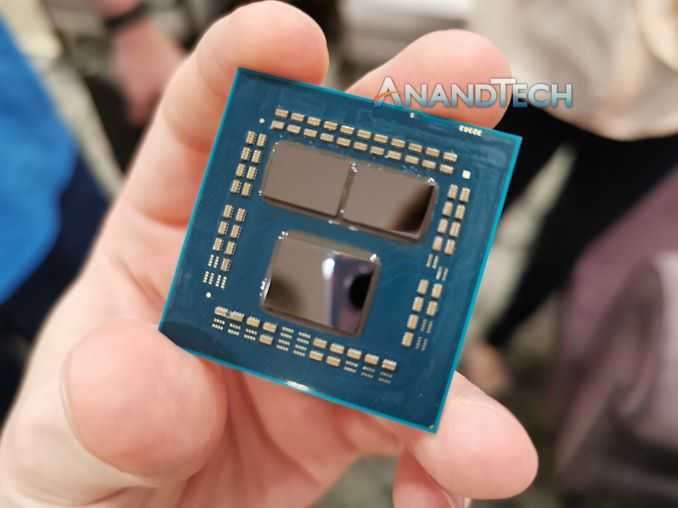Reaching for Turbo: Aligning Perception with AMD’s Frequency Metrics
by Dr. Ian Cutress on September 17, 2019 10:00 AM EST
For those that keep a close eye on consumer hardware, AMD recently has been involved in a minor uproar with some of its most vocal advocates about the newest Ryzen 3000 processors. Some users are reporting turbo frequencies much lower than advertised, and a number of conflicting AMD partner posts have generated a good deal of confusion. AMD has since posted an update identifying an issue and offering a fix, but part of all of this comes down to what turbo means and how AMD processors differ from Intel. We’ve been living on Intel’s definitions of perceived standards for over a decade, so it’s a hard nut to crack if everyone assumes there can be no deviation from what we’re used to. In this article, we’re diving at those perceived norms, to shed some light on how these processors work.
A Bit of Context
Since the launch of Zen 2 and the Ryzen 3000 series, depending on which media outlet you talk to, there has been a peak turbo issue with the new hardware. This turbo frequency issue has been permeating in the ecosystem since Zen 2 was launched, with popular outlets like Gamers Nexus noting that on certain chips, the advertised turbo frequency was only achieved under extreme cooling conditions. For other outlets, being within 50 MHz of the peak turbo frequency has been considered chip-to-chip variation, or a function of early beta firmware. A wide array of people put varying amounts of weight behind this, from conspiracy to not being bothered about it at all.
However, given recent articles by some press, as well as some excellent write-ups by Paul Alcorn over at Tom’s Hardware*, we saw that the assumed public definitions of processor performance actually differs from Intel to AMD. What we used as the default standard definitions, which are based on Intel’s definitions, are not the same under AMD, which is confusing everyone. No one likes a change to the status quo, and even with articles out there offering a great breakdown of what's going on, a lot of the general enthusiast base is still trying to catch up to all of the changes.
This confusion – and the turbo frequency discussion in general – were then brought to the fore of news in the beginning of September 2019. AMD, in a two week span, had several things happen essentially all at once.
- Popular YouTuber der8aur performed a public poll of frequency reporting that had AMD in a very bad light, with some users over 200 MHz down on turbo frequency,
- The company settled for $12.1m in a lawsuit about marketing Bulldozer CPUs,
- Intel made some seriously scathing remarks about AMD performance at a trade show,
- AMD’s Enterprise marketing being comically unaware of how its materials would be interpreted.
Combined with all of the drama that the computing industry can be known for – and the desire for an immediate explanation, even before the full facts were in – made for a historically bad week for AMD. Of course, we’ve reported on some of these issues, such as the lawsuit because they are interesting factoids to share. Others we ignored, such as (4) for a failure to see anything other than an honest mistake given how we know the individuals behind the issues, or the fact that we didn’t report on (3) because it just wasn’t worth drawing attention to it.
What has driven the discussion about peak turbo has come to head because of (1). Der8auer’s public poll, taken from a variety of users with different chips, different motherboards, different cooling solutions, different BIOS versions, still showed a real-world use case of fewer than 6% of 3900X users were able to achieve AMD’s advertised turbo frequency. Any way you slice it, without context, that number sounds bad.
Meanwhile, in between this data coming out and AMD’s eventual response, a couple of contextual discrepancies happened between AMD’s partner employees and experts in the field via forum posts. This greatly exacerbated the issue, particularly among the vocal members of the community. We’ll go into detail on those later.
AMD’s response, on September 10th, was a new version of its firmware, called AGESA 1003-ABBA. This was released along with blog post that detailed that a minor firmware issue was showing 25-50 MHz drop in turbo frequency was now fixed.
Naturally, that doesn’t help users who are down 300 MHz, but it does come down to how much the user understands how AMD’s hardware works. This article is designed to shed some light on the timeline here, as well as how to understand a few nuances of AMD's turbo tech, which are different to what the public has come to understand from Intel’s use of specific terms over the last decade.
*Paul’s articles on this topic are well worth a read:
Ryzen 3000, Not All Cores Are Created Equal
Investigating Intel’s Claims About Ryzen Reliability
Testing the Ryzen 3000 Boost BIOS Fix
This Article
In this article we will cover:
- Intel’s Definition of Turbo
- AMD’s Definition of Turbo
- Why AMD is Binning Differently to Intel, relating to Turbo and OC
- A Timeline of AMD’s Ryzen 3000 Turbo Reporting
- How to Even Detect Turbo Frequencies
- AMD's Fix











144 Comments
View All Comments
allenb - Tuesday, September 17, 2019 - link
Nicely done, Ian, very nicely done. The PC hardware world could do with more reporting like this.eva02langley - Wednesday, September 18, 2019 - link
Indeed, all the so called PC tech press should be ashamed of how they spun this story. Toms didn`t even switch motherboard while testing this issue. The motherboard was the problem and they just transposed the problem to all their testings.Toms is officially a joke of a site. Nothing coming from them since Just Buy It! can be trusted.
JasonMZW20 - Tuesday, September 17, 2019 - link
As always, very insightful background, analysis, and ultimate conclusions, Dr. Cutress (had to shoe that in because it sounds cool, right?).I felt it was a bit overblown and I knew that performance with the "fixed" BIOS would be within standard deviation. I said as much on Reddit too. Software polling has limitations, as you rightly pointed out.
Arbie - Tuesday, September 17, 2019 - link
A very high quality article - upholding the AT standard for sure - which was sorely needed. Thanks!davide445 - Wednesday, September 18, 2019 - link
Finally an intelligent article looking at objective elements.So bored in reading Tom's hardware articles (that I avoid as possible if there are any other option) , where is clear in my opinion the focus as pro Intel ads. Fast articles so they are the only one on the subject, no real deepening of the subject but only on controversial elements, no comments possible so just a single opinion. Unfortunately I suppose this is how media is working and getting paid.
Peter2k - Wednesday, September 18, 2019 - link
Just a note that der8auer actually asked AMD, and AMD told him, which software to use, which frequency for monitoring and which software to use to produce loadWhich Windows version, which drivers,....
So how to monitor and how its read, sure, but AMD did specify, so by AMD rules it should stack up to AMD marketing figures
Secondly
Ryzen 3000 is a good CPU even when missing 50Mhz, if they can't boost that, then don't advertise on the "optimistic side"
If silicone lottery really plays into this, just be pragmatic about it
Thirdly
Don't have an official marketing video out talking, and drawing curves, about reaching 4.75 when most CPU's can't really reach 4.5
eva02langley - Wednesday, September 18, 2019 - link
Well, some of the chips are hitting the announced frequency...And now even more after this new AGESA update.
Oliseo - Wednesday, September 18, 2019 - link
Dude, asking a bunch of techies who follow sites like this and deciding that 67% of customers do not expect CPU's to hit their turbo frequencies... Do I need to state the obvious here?If the average Joe see's "4.7Ghz Turbo", they expect "4.7 Turbo", and anything else than that is fraud.
eva02langley - Wednesday, September 18, 2019 - link
You read the article? Those are not guaranteed speed and most of the time the difference in speed doesn`t translate in better performances.twtech - Thursday, September 19, 2019 - link
Yes, I read the article, I read and understood the reasoning behind it - I still disagree with it. If most of your chips can only hit 4.5 and not 4.7, then market it as 4.5 GHz turbo. If you want to sell the 4.7 chips as 4.7, then bin for it.